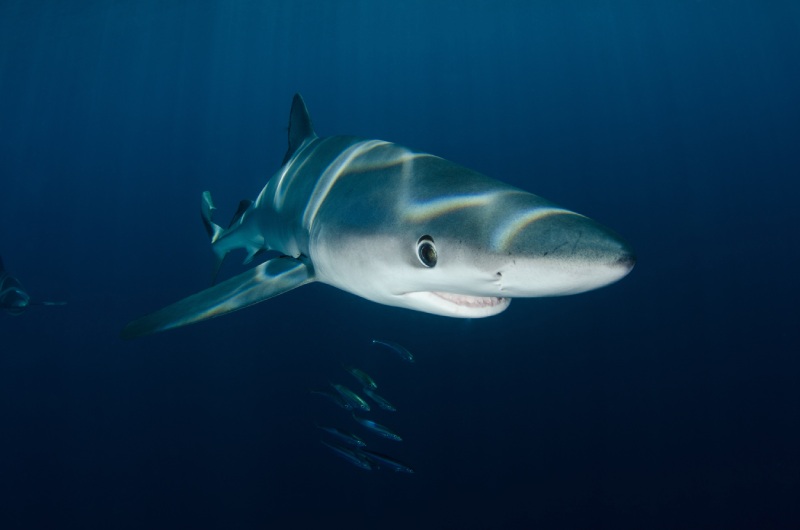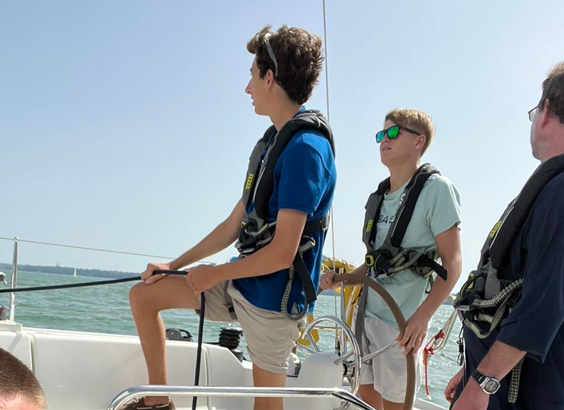Sharks in the UK

Sharks around the UK
When you consider the biodiversity of the UK, sharks might not be the first animal that comes to mind. But these mysterious, long-lived predators do in fact prowl the seas off the British Isles.
What Sharks Are in the UK?
Although the waters around the UK may not be as well-known for shark sightings as those in Australia or South Africa, they are home to a variety of fascinating shark species.
The Porbeagle Shark (Lamna nasus)
The great white shark’s relative, the porbeagle shark, is a real ocean traveller. The porbeagle is a fearsome predator noted for its sleek physique and stunningly muscular structure. These sharks are present in the cooler northern Atlantic waters, particularly those near the UK. They are renowned for their protracted migrations, which can occasionally cover thousands of kilometres.
The Common Smoothhound (Mustelus mustelus)
The common smoothhound is anything but common in appearance, despite its name. These tiny sharks are frequently spotted in the shallower coastal waters of the UK, especially in the southwest. They have a striking, sleek appearance with skin that is smooth and bronze in colour. These sharks are well-known for their propensity for bottom-dwelling and are generally safe for people.
The Spiny Dogfish (Squalus acanthias)
One of the most prevalent shark species in the UK is the spiny dogfish, sometimes called the spurdog. The UK’s seas provide a great environment for these little sharks, which get their name from the jagged spines in front of their dorsal fins. The opportunistic predators known as spiny dogfish eat a range of tiny fish and invertebrates.
The Tope Shark (Galeorhinus galeus)
Another dweller of UK waters is the tope shark, sometimes known as the school shark. The tope, which has a slim body and a greyish-brown colouring, is a graceful swimmer. When these sharks travel closer to shore in the summer, it’s common to see them because of their enormous schools.
The Lesser Spotted Dogfish (Scyliorhinus canicula)
The lesser spotted dogfish, also known simply as the dogfish, is a small shark that is frequently found in the coastal waters of the UK. These sharks have a striking body pattern of tiny dark patches. Although they might not be the biggest or scariest sharks, divers and anglers alike are accustomed to seeing them in the UK’s oceans due to their prevalence.
Conservation Efforts
The importance of conservation efforts to safeguard these apex predators and the marine ecosystems they inhabit is highlighted by the presence of several shark species in UK seas. Let’s look at some of the programmes designed to protect these amazing animals.
Marine Protected Areas (MPAs)
Around the UK, Marine Protected Areas have been created to preserve shark populations and other aspects of marine biodiversity. These zones have been set aside to protect marine life and limit some human activities. For the tope shark, for instance, and other marine species, the Lundy Island MPA is an essential habitat.
Sustainable Fishing Practices
To protect shark populations, sustainable fishing methods are crucial. Shark populations are kept from being overexploited with the use of programmes and policies that reduce bycatch, such as size restrictions and quotas. For instance, the common smoothhound has benefited from fishing rules that prioritise conservation.
Shark Tagging and Research
Researchers and scientists working to better understand shark behaviour, migration patterns, and population dynamics in the UK are actively involved in shark tagging programmes. For the implementation of successful conservation initiatives, this information is essential.
Public Awareness and Education
Another crucial component of conservation efforts is educating the public about the significance of sharks in the marine ecosystem. Organisations and educational institutions hold public events and outreach programmes to educate people about these amazing species and the reasons they require protection.
International Collaboration
Due to their extensive migration, sharks frequently require international collaboration for conservation. To ensure the conservation of shared shark populations, the UK works with other nations, notably in the North Atlantic.
Latest posts







